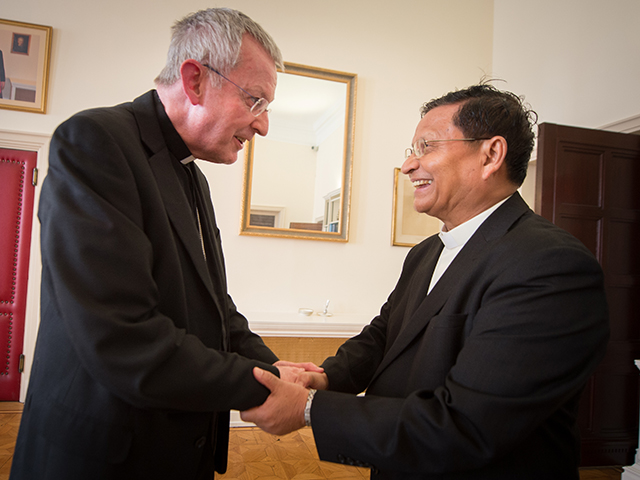
The following article was first published in The Catholic Universe, Friday 24 June, in it Bishop Declan Lang reflects on Cardinal Bo’s historic visit to the UK and Burma’s momentous reforms.
Today the world often feels bereft of the enormous optimism that accompanied the collapse of communism and apartheid in the early 1990s. Contrary to the historic scenes of millions celebrating their liberation from tyranny, our news in 2016 is frequently dominated by despatches from countries where extremism and dictatorship are gaining the upper hand while people’s most fundamental human rights are stripped away.
Against this backdrop, the message of hope that Burma’s Cardinal Bo shared during his historic visit to the UK last month was both inspiring and refreshing. His country is undergoing a momentous transition, perhaps unparalleled since those that took place in the East of Europe and South Africa over two decades ago.
Celebrating Mass in Westminster Cathedral the Cardinal explained how for half a century Burma languished under a vicious and heatless dictatorship. “Being a Christian was a risk those days. I stand here with a heavy debt of gratitude to the UK’s Catholic Church, civil society and government for the support rendered to the people of Burma. Through advocacy and international campaign you stood by us in our darkest hour. Today democracy has its dawn.”
As he greeted excited Burmese exiles on the Cathedral steps, the contrast with those dark days could not have been starker. Back in 2007 the streets around Westminster were packed as thousands of people marched in solidarity with the pro-democracy demonstrations that had broken out in Yangon and other major cities across Burma. Meanwhile the regime was preparing a bloody crackdown that within days saw scores of monks, journalists and students gunned down, while hundreds of others disappeared into prison cells and torture chambers.
Burma’s totalitarian system like so many before it felt undefeatable back then. But as domestic dissent and international pressure continued to mount the regime began to buckle was forced into a dramatic reform process that few ever dreamed possible.
When I visited Cardinal Bo in 2013 the country was already changing and there was excitement in the air. Aung San Suu Kyi had been released after more than a decade in detention and was leading the National League for Democracy (NLD) in preparations for a general election; troops had almost completely withdrawn from the streets; while books and newspapers were being sold without censorship for the first time in a generation.
When in 2015 the election arrived and the NLD secured an overwhelming victory, that excitement turned to jubilation. Across the country democracy supporters celebrated in scenes that would have invariably resulted in their arrest just a few short years ago. Since then we’ve witnessed an endless stream of historic moments including the formation of a democratic parliament and hundreds of political prisoners walking to freedom amid cheering crowds.
The bravery of Burma’s small but vocal Catholic Church played an important role in helping the country to reach this juncture. During the regime years the risks that Cardinal Bo spoke about were always present, even at Sunday Mass when secret police would enter Churches to spy on clergy and monitor sermons for criticism. Dioceses in ethnic minority regions paid a particularly heavy price with Churches destroyed, confiscated and ransacked by troops, often because of their perceived support for rebel groups.
Drawing on the strength and courage forged during that time, the Church is now at the forefront of tackling the myriad challenges that Burma faces at the start of this new era. After decades of neglect the healthcare and education system are in disarray, while in Northern regions more than 200,000 people remain displaced by violent conflict. Yet with the support of their brothers and sisters around the world including through our own agencies such as Missio and CAFOD, Burma’s Catholics are working tirelessly to help rebuild the country.
Although sectarian tensions stoked by Buddhist extremist groups continue to pose a threat, the Church is actively promoting interfaith relations and Cardinal Bo has been one of the most prominent advocates for the persecuted Rohingya Muslim minority, who have so far been left behind by Burma’s reforms. Speaking to British MPs he described the Rohingya’s plight as “an appalling scar on the conscience of my country” and called for the international community to help ensure the new government urgently restores their rights.
Catholic clergy and laity are also spearheading the fight against human trafficking, which has long been fuelled by the dire poverty and impunity from a regime infamous for forced labour and sexual violence. Later this year Cardinal Bo will become Burma’s first ever representative at the Santa Marta Group meeting in Rome, joining the unprecedented alliance of international police chiefs and bishops from around the world working together to eradicate trafficking and modern day slavery.
While Burma is still at the start of a long journey, the momentous changes taking place have finally given its sixty million people genuine hope for a better future. If we remain firm in our support for the local Church and all of those seeking to promote human dignity there is cause to be optimistic.